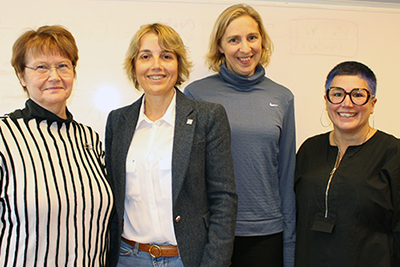Q-SCI: A powerful voice for women in academia
Q-SCI has long been a catalyst for change and a strong voice for female faculty at SCI. By creating a platform where women can meet and share experiences, the network has become an important resource in working towards the school's and KTH's gender equality goals.
Under the leadership of professor Carlota Canalias Gomez and professor Linda Lundström, Q-SCI has faced challenges and celebrated successes. As their mandate comes to a close, they reflect on their work and the milestones the network has achieved.
Visibility and community
Through their commitment, Linda and Carlota have developed Q-SCI into more than a meeting place. They have created a powerful channel for dialogue with the school management. "We have given the female faculty a voice and created a channel to the management. That's what made our mission meaningful," says Carlota, emphasising that they wanted to make a difference.
Q-SCI has empowered women academics and made them aware that they are not alone and able change their situation. As Linda puts it, the network's efforts have helped to 'normalise' the presence and visibility of women in academia, which has been crucial in creating a more inclusive and supportive climate.
Notable milestones
During their years as coordinators, Q-SCI have grown significantly and attracted an increasing number of faculty members and PhD students. Carlota and Linda are particularly proud of a problem inventory report that sparked discussions and paved the way for organisational changes at the school. This report won them, together with Lisa Prahl Wittberg, KTH's Equality and Diversity prize.

A central part of Q-SCI's work has also been the mentor programme, an initiative that enabled young women to gain valuable insights from experienced colleagues about their personal journeys in academia.
"Having access to female role models who not only understand the landscape of KTH and academia, but also the specific challenges we face, is invaluable. It is these meetings that make the real difference," they say.
Turning challenges into opportunities
Setbacks on the way have only underlined the importance of cooperation and support within the network. Working together has also proved to be crucial when dealing with controversy. "Our partnership has been a key factor in overcoming challenges. Being two has allowed us to support each other, to reflect together and to be able to talk openly about the reactions we have faced," they say.
Both Linda and Carlota feel that there has been a change in the academy's attitude towards gender equality issues over the years, noting that the discussion has become more constructive and less polarised. They also emphasise societal changes, such as the #metoo movement, as contributing factors to a better climate.
Mission accomplished, the commitment continues
With a number of successful initiatives behind them, they are ready to hand over the wheel, but remain committed to the issue: "We will not forget and stop working for gender equality just because this project is over. The issue is just too close to our hearts," says Carlota, and Linda continues: We carry what we have learned and use it not only in our leadership roles, but also as supervisors, mentors or colleagues. We can shape the debate and remind people to really see each other.
However, they do not want to give any guidance to their successors: "It's time for new energy and new ideas. But we will always be here to listen and offer support when needed," they conclude.
